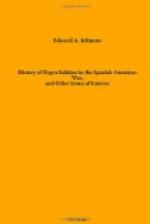CHAPTER I.
THE CAUSE OF THE WAR WITH SPAIN.
Many causes led up to the Spanish-American war. Cuba had been in a state of turmoil for a long time, and the continual reports of outrages on the people of the island by Spain greatly aroused the Americans. The “ten years war” had terminated, leaving the island much embarrassed in its material interests, and woefully scandalized by the methods of procedure adopted by Spain and principally carried out by Generals Campos and Weyler, the latter of whom was called the “butcher” on account of his alleged cruelty in attempting to suppress the former insurrection. There was no doubt much to complain of under his administration, for which the General himself was not personally responsible. He boasted that he only had three individuals put to death, and that in each of these cases he was highly justified by martial law.
Finally the attention of the united states was forcibly attracted to Cuba by the Virginius affair, which consisted in the wanton murder of fifty American sailors—officers and crew of the Virginius, which was captured by the Spanish off Santiago bay, bearing arms and ammunition to the insurgents—Captain Fry, a West Point graduate, in command.
Spain would, no doubt, have received a genuine American thrashing on this occasion had she not been a republic at that time, and President Grant and others thought it unwise to crush out her republican principles, which then seemed just budding into existence.
The horrors of this incident, however, were not out of the minds of the American people when the new insurrection of 1895 broke out. At once, as if by an electric flash, the sympathy of the American people was enlisted with the Insurgents who were (as the Americans believed) fighting Spain for their liberty. Public opinion was on the Insurgents’ side and against Spain from the beginning. This feeling of sympathy for the fighting Cubans knew no North nor South; and strange as it may seem the Southerner who quails before the mob spirit that disfranchises, ostracises and lynches an American Negro who seeks his liberty at home, became a loud champion of the Insurgent cause in Cuba, which was, in fact, the cause of Cuban Negroes and mulattoes.
General Fitzhugh Lee, of Virginia, possibly the most noted Southerner of the day, was sent by President Cleveland to Havana as Consul General, and seemed proud of the honor of representing his government there, judging from his reports of the Insurgents, which were favorable. General Lee was retained at his post by President McKinley until it became necessary to recall him, thus having the high honor paid him of not being changed by the new McKinley administration, which differed from him in politics; and as evidence of General Fitzhugh Lee’s sympathy with the Cubans it may be cited that he sent word to the Spanish Commander (Blanco) on leaving Havana that he would return to the island again and when he came he “would bring the stars and stripes in front of him.”




